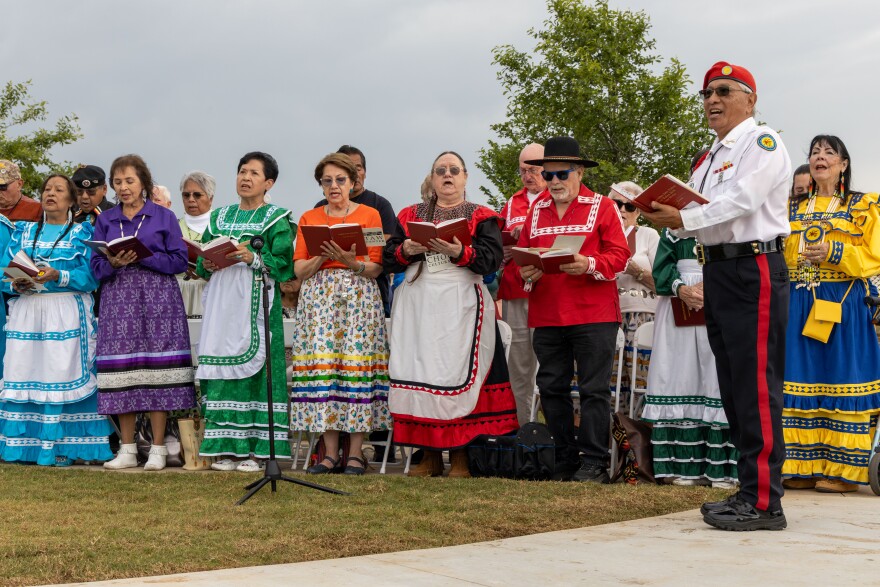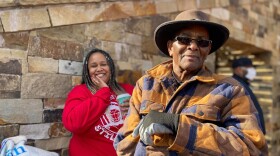Sworn to secrecy, they hid the details of their service from family members until their story came to light decades later.
Nuchi Nashoba is the great-granddaughter of Ben Carterby, one of the Choctaw Code Talkers.
Nashoba said growing up, she asked her grandmother about Carterby's service to no avail. Now, she's the president of the Choctaw Code Talkers Association, proudly sharing information that was once a secret in her family.
"I'm not sure if she [my grandmother] knew all the details, because she would just say, 'Oh, he went to war,' and that's it," Nashoba said.
Carterby attended Armstrong Academy, a Native American boarding school in southern Oklahoma, alongside future code talkers. Like other boarding schools at the time, Native languages were forbidden in an attempt to assimilate Native Americans.

But in World War I, the forbidden language became a necessary tool.
While German soldiers were able to decipher allied transmissions, the United States discovered the Choctaw language could thwart adversaries because it was unknown to Europe. So, the military turned to the enlisted Choctaw soldiers.
"They were told they could not speak their Native language. If you were caught in a boarding school, you were punished for speaking your language. You had to speak English, and that was the unique part about World War I," Nashoba said. "You could imagine these guys that were buddies because they were all from Armstrong Academy. They all knew each other, and they probably were huddled somewhere just talking in their Native language when they were overheard."
They were required to create translations in a short amount of time. According to Nashoba, "machine gun" was translated to the Choctaw equivalent of "little gun shoot fast," and "tanchi," the Choctaw word for "corn," stood in for "artillery."
In May, the Choctaw Nation unveiled three bronze statues outside its cultural center in Calera, Oklahoma. The memorial features a larger-than-life-sized composite of the soldiers in the middle of a battle.
The artist, Jane Umsted, said each statue depicts a code talker's actions in the fields of war-torn France.
One bronze soldier holds a crank radio while relaying orders, while another sits beside him writing the orders in Choctaw. An armed soldier stands behind them, overlooking the surroundings.
"That's what I wanted to do, is show what it was that they were doing," Umsted said. "It's permanent. It'll be here forever … as a visual way that all of us can be proud forever."

'They honored their word to stay private and protect where they were'
The Choctaw veterans paved the way for their Navajo counterparts in World War II, but are less revered due to the secrecy surrounding their work imposed by the US government.
Joseph Oklahombi is one of the most decorated soldiers from Oklahoma to ever serve. Yet, his great-nephew Lee Watkins believes his war efforts went largely unrewarded by the American government.

Oklahombi was raised in the small town of Wright City in southeast Oklahoma. He spoke little English and relied on his friend Carterby to translate other soldiers.
After the war, he lived a quiet life. His days were spent hunting and fishing until he died in 1960.
And he did not disclose his war efforts.
"Joseph Oklahombi and even the other code talkers, they were worthy enough to receive medals here from the United States of America," Watkins said. "When he got back to Oklahoma … it just was pushed to the side."
According to Erin Fehr, Oklahombi and Carterby were considered ineligible for the Medal of Honor.
Fehr is the assistant director and archivist at the Sequoyah National Research Center in Little Rock, Arkansas. The center studied a list of Native American veterans during World War I who might now be eligible for the Medal of Honor. They weren't considered back then because of race.
Fehr said neither Oklahombi and Carterby received a Distinguished Service Cross, Croix de Guerre with Palm or Navy War Cross medal. Although, Oklahombi received a Croix de Guerre with a Bronze Star, which is one level below the requirement, according to Fehr.
"We really tried with him, but unfortunately, they had to put certain parameters in place, and he did not qualify for the Valor Medals Review," Fehr said.
Watkins said French historians visited Oklahombi's gravesite in Broken Bow, expecting to see an extravagant memorial adorned with statues.
"It's just a regular gravesite. If you didn't look for it really, you would probably miss it," Watkins said.

Delayed recognition
Over time, the code talkers have received some posthumous recognition.
The Choctaw Nation awarded the soldiers with Choctaw Medals of Honor in 1986.
The French government awarded the code talkers with the Knight of the National Order of Merit medal in 1989, almost 20 years before the United States would recognize them.
In 2008, the Code Talkers Recognition Act was signed into law at the federal level, acknowledging and awarding Native American veterans from both World War I and World War II with Congressional Gold Medals.
Nashoba's daughter, Ta'Na Alexander, said the soldiers are entitled to these awards.
"They honored their word to stay private and protect where they were, what they did, and it remained a secret," Alexander said. "This is a story that needs to be told."
World War I ended in 1918, six years before Native Americans would be granted citizenship in the United States. This lack of citizenship, combined with the code talkers' insistence on secrecy, meant that their story would go untold for decades.
But the Choctaw Code Talkers were patriotic. Oklahombi walked more than a dozen miles from Wright City to Idabel to join the military because Watkins said he felt it was his duty to protect his home.
"He says, 'I'm going to learn. I'm going to go serve because I think I should. This is my country,'" Watkins said. "I don't know if you've been to Wright City, Oklahoma, but there's not a whole lot. It's small, real small. But that was his home."
Watkins thinks Oklahombi didn't consider his lack of citizenship or the potential for awards.
Instead, the code talkers were likely driven by a commitment to their home.
Nashoba said that in France, allied soldiers understood the roots of the Choctaw language.
Confused, captured Germans questioned where the indiscernible language originated from. Nashoba said American soldiers obliged.
"Their response was: 'American,'" she said.
Sarah Liese contributed to this story.
This report was produced by the Oklahoma Public Media Exchange, a collaboration of public media organizations. Help support collaborative journalism by donating at the link at the top of this webpage.









